Here's What "Pokkén Tournament DX" Taught Me About Fighting Games
Here's What "Pokkén Tournament DX" Taught Me About Fighting Games
“The most important thing is to have fun,” adviser Nia reminds you at least once during every Pokkén Tournament DX battle. She is your tour guide, tutorial master, and cheer captain throughout the game — and, for me personally, a ubiquitous reminder of how much fun I'm not having (but could be).
Don't get me wrong — there is a lot to love in Pokkén: The graphics are great. The gameplay feels smooth. The sampling of playable Pokémon is a nice reminder of just how large the franchise has become. But at its core, it's a fighting game, not a Pokémon game, and while I love the latter, I've always despised the former.
Maybe if I were any good at fighters, I'd feel differently, but, to me, they've always felt repetitive, frustrating, and silly. I gave Pokkén a shot only because it takes place in a universe I love (and tbh I just couldn't pass up the chance to play as a realistic-looking, ass-kicking Empoleon).
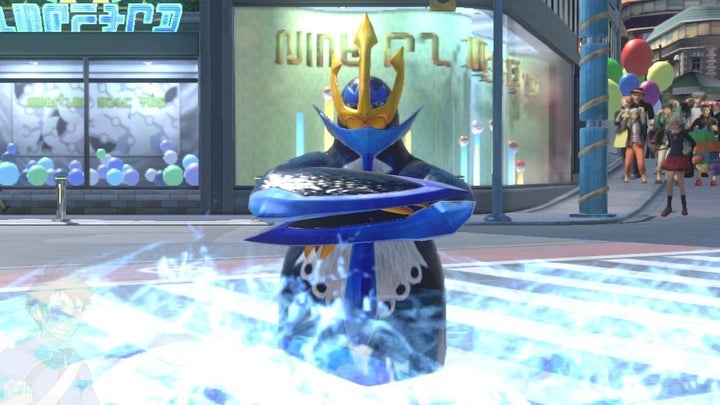
Don't mess.
Nintendo
“Once you start really digging into [fighters], they're basically a high-speed version of chess.”
As I journeyed through Pokkén, I leaned on my Street Fighter–obsessed friend Mike Andronico, who's also a senior editor at Tom's Guide, for helpful tips and advice. “On a basic level, fighting games are video games at their purest,” he told me. (Nerd.) “You and your friend beat each other up until one of you is knocked out. What's more straightforward and fun than that? But once you start really digging into them, they're basically a high-speed version of chess. You and your opponent are constantly trying to outsmart each other on a second-by-second basis, and when you make that smart guess or land that crazy combo, it provides a rush that you just can't get from other types of games.”
As I continued playing, I tried to actualize this mindset and devoted time to the tutorial, learning combos, and thinking of the game strategically. So for others who are similarly inexperienced and/or skeptical of the fighting game genre, here are some basic tenets of Pokkén I took away:
1. The breadth of customization options is silly, hilarious, and really fun.
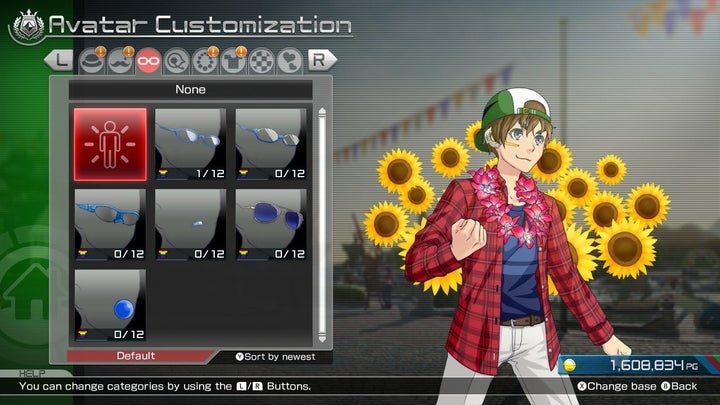
Nintendo
I was not expecting the level of customization Pokkén offers because why would you expect much of *any* customization in a fighting game? (At least I've never seen customization like this in a fighter.) But the plethora of possibilities, while largely (if not completely) unimportant to the main gameplay, brought me nothing but joy. There's no reason I should have been able to deck my trainer out in items that reflect my upcoming Hawaiian vacation, and yet there he is in a lei among sunflowers wearing his finest hipster flannel. OK, Nia, NOW I'm having fun.
And speaking of Nia…yes, you can even customize HER outfits.
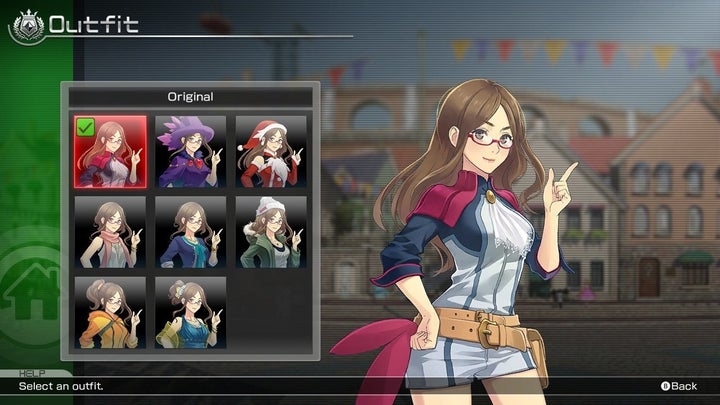
Santa Nia because why not.
Nintendo
It makes absolutely no sense and, when it comes to the mechanics of actually playing the game, doesn't matter in the slightest, but I can't wait to keep playing to see if I'll unlock more. Aside from my innate desire to just not suck at fighting games, customization is my main motivation for advancing.
Not to mention the absurd number of titles and “self-promotions” you can choose from.
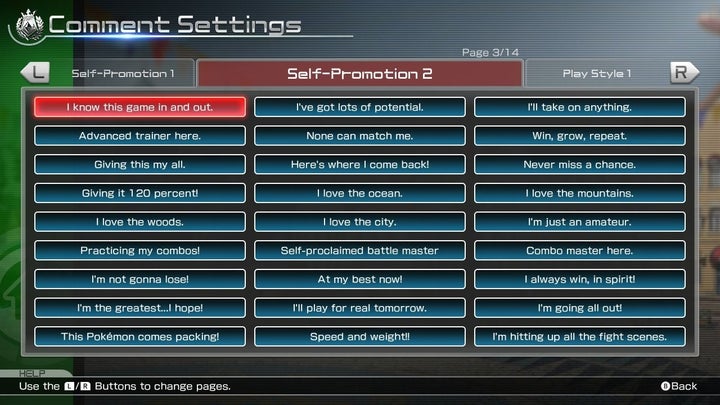
Nintendo
“I love the woods” vs. “I always win, in spirit!” was my Sophie's Choice.
2. Sometimes you can run freely around the whole arena; sometimes, à la classic fighters, you just face each other.
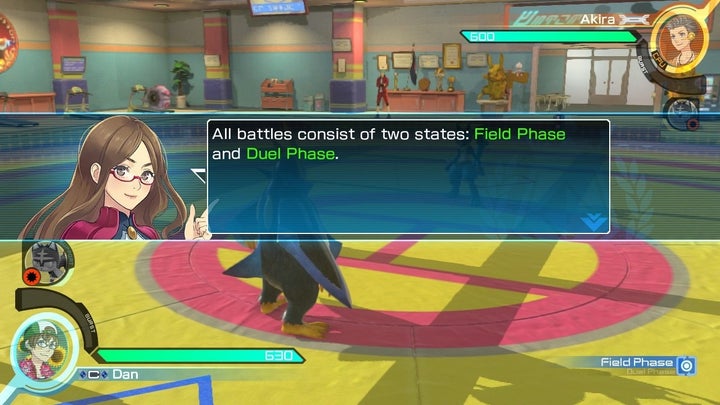
Nintendo
As the all-knowing Nia states above, the two phases are called Field Phase (aka running around freely) and Duel Phase (aka classic left and right movement only). You can make the battle shift between phases by successfully executing certain moves. Why? I have no idea, but, honestly, I really like it. It gives you more to accomplish than simply KOing your opponent, and I realized that I much prefer fighting games when I'm afforded more mobility. Field Phase reminds me a lot of an earlier Switch release, Arms, which I'm shockingly pretty good at (tyvm). Part of me wishes the whole game were like this.
“[Field Phase] gives you more to accomplish than simply KOing your opponent, and I realized that I much prefer fighting games when I'm afforded more mobility.”
Unsurprisingly, fighting game elitist Mike disagreed. “The game just feels kinda loose and sloppy when you're floating around in 3D,” he said. “Once you get into the 2D Duel Phase, the game starts to feel like a proper fighter” — (lol) — “in which things such as spacing and combos matter.” But Mike sucks at Arms, so what does he know, amirite?
A key takeaway here? Training mode is your friend. Listen to Nia, despite her Navi-like tendencies. And, as Mike told me, “Don't worry about pulling off crazy combos right away. It's far more important knowing the range and properties of your character's basic attacks and how those might be useful in battle. Once you have those fundamentals in place, you can start learning flashier stuff.”
3. The Attack Triangle is an easy-to-follow but hard-to-execute endless cycle of grabs and counters.
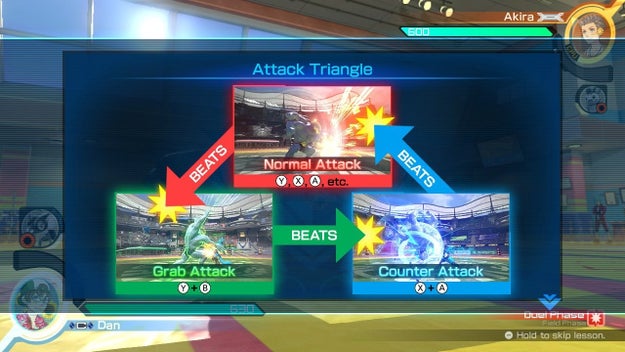
Nintendo
The this-beats-this-beats-that system is a sensical and interesting element of Pokkén I found easy to understand but difficult to put into practice. Blame it on having a slower-than-normal reaction time if you must, but I was only really able to counter a counter with a grab attack by accident. Nonetheless, knowing about it really helped me enjoy the mechanics of the game more. I found myself trying to anticipate my opponents' moves and strategizing more than I normally would rather than simply button-mashing my way to non-victory. I'm not sure if this mechanic is unique to Pokkén, but it feels new and different to me.
Another key takeaway: Watch tons of matches. Mike is a firm believer that watching your favorite fighting game being played at a high level is just as integral as playing yourself. Once you have a decent understanding of your game of choice, you can learn a ton about how to optimally use the characters and mechanics when watching two really talented players go at it.
Pro tip: Focus on tournament footage on Twitch or YouTube.
3. Watching the Pokémon run around, punch, kick, and hurl magical blasts is pretty dope, albeit a little weird.
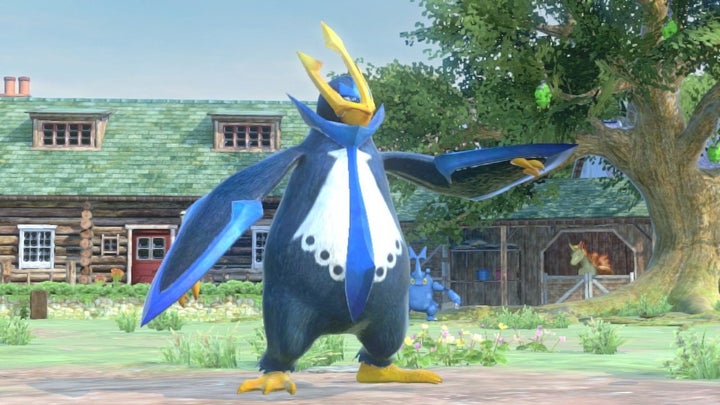
I see you, Ponyta.
Nintendo
There's something a little disconcerting and awkward about having Pokémon we know and love as mostly inactive creatures run around on two legs in all their 3D glory, but ultimately you get used to it. And their specials are admittedly pretty badass.
4. Support Pokémon are cute but pretty much all the same.
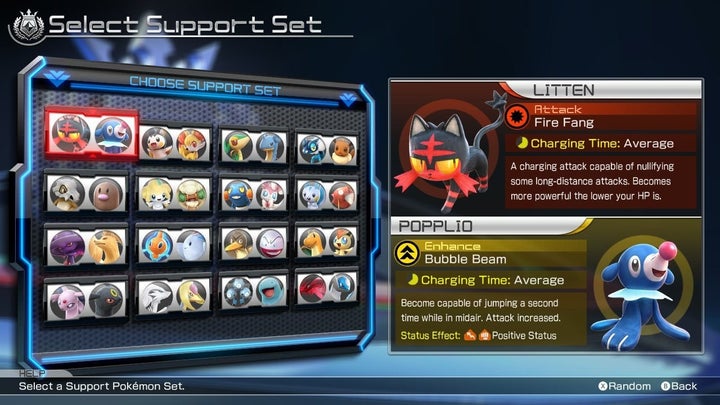
Nintendo
Support Pokémon are a nice excuse to be able to feature more Pokémon in the game, and the feature is a fun twist on tagging in help, but despite their different “attack,” “enhance,” etc., abilities, they're not really all that different or helpful in the scheme of things. Maybe they're of much greater importance for a Pokkén master, but still, I think there's an option to choose a “random” set for a reason.
5. The game makes you feel pretty invincible…for a while.
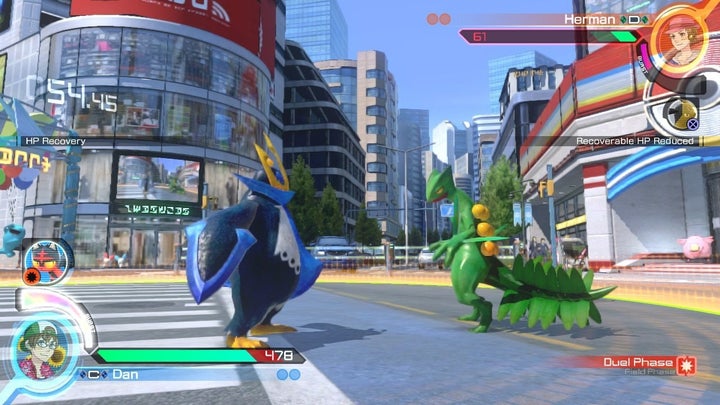
Nintendo
As you're well aware by now, I'm obviously pretty sh*tty at fighting games, but Pokkén does a good job of letting even the least skilled players feel powerful for a while, which gives you a lot of time to perfect your combos and strategy. Tbh, it's downright easy to coast through the various leagues, but because of the grading system that pops up after every battle — which includes a grade on your technique — you're always pushed to develop various aspects of your fighting style.
“'Online will continue to be a core part of every fighting game, but 'most of the good fighting games out there still do a great job catering to single-player folks.'”
What's not easy though? Playing online. After 30 consecutive wins playing against the league CPUs, I felt like I was ready to try other IRL players. But that confidence, I learned, was completely undeserved. I was destroyed countless times in a row. I could barely even get one hit in let alone a combo or counter and several times I was honestly *this close* to throwing my controller against the wall and swearing off the game for good.
According to Mike, although “online has become integral to just about every fighting game … games such as Injustice 2, Tekken 7, and Pokkén are brimming with fun solo content, meaning you won't have a cheapened experience if you don't feel like getting destroyed online.” He thinks online will continue to be a core part of every fighting game, but “most of the good fighting games out there still do a great job catering to single-player folks.” Phew.
An important lesson: Patience is a virtue. I expected to pick up my controller and become a PokéMaster after just a few hours, and while at times the game made me feel like I was, it takes a lot more time than that “to be the next Evo champ,” as Mike put it.
At the end of the day, I agree with Mike's assessment that “Pokkén is one of the best fighting games out there in terms of being easy to learn and hard to master.” For beginners, it's great to play when you're bored and want to have some casual fun (but beware of online); for more experienced players, it must also be a lot of fun to play online and kick beginners' asses.
One last word of advice: Find a community or training partner. From weekly fighting game meet-ups in your area to friends who are also trying to get better, set aside time to practice with real people. It's way more fun that way! Online communities like Reddit and dedicated FG sites like Shoryuken and EventHubs are also filled with folks willing to help out.
And finally, as Nia says (quite often), have fun! Despite my initial misgivings, I really came around to Pokkén in the end and embraced its weirdness, uniqueness, and playability. Fighting games aren't as vapid or boring as I'd originally thought, and embracing the strategy and time required to master them made playing that much more rewarding in the end.
All images from Nintendo
